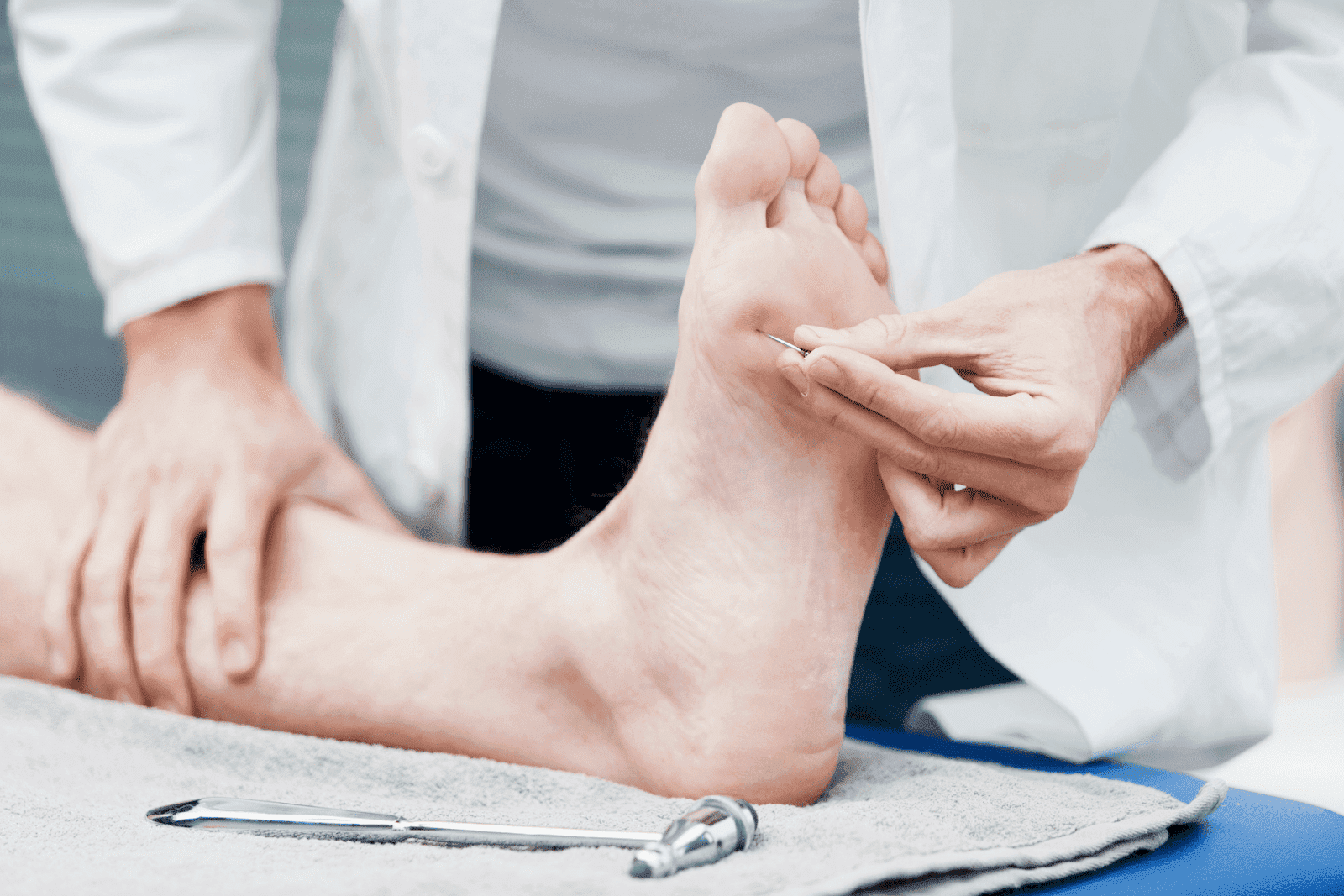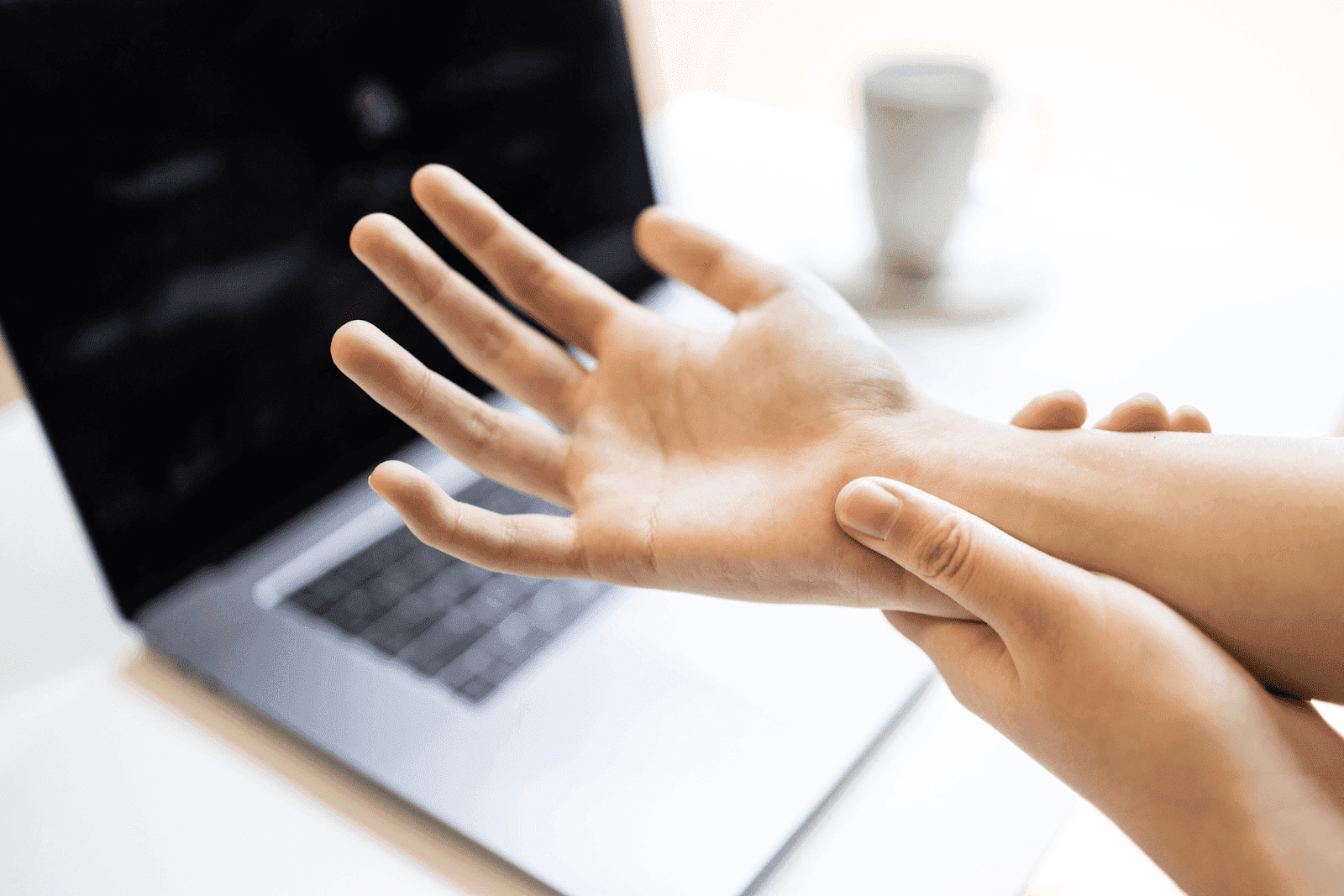How to Get Feeling Back After Nerve Loss
Nerve loss, also known as neuropathy or nerve damage, can profoundly affect your quality of life. Whether caused by injury, illness, or chronic conditions, losing sensation [...]
Read More
Medically reviewed by Alan Lucks | MD, Alan Lucks MDPC Private Practice - New York on October 12th, 2025.
Recovery timeframes vary dramatically from 2-4 weeks for minor compression injuries to 2+ years for severe damage, with peripheral nerves regenerating at approximately 1mm per day.
Electrical stimulation therapy combined with targeted exercises can increase regeneration rates by 30-50%, while medications like gabapentin (300-600mg daily) help manage neuropathic pain during healing.
Vitamin B12 injections (1000mcg weekly) and alpha-lipoic acid supplements (300-600mg daily) have shown clinical evidence in supporting myelin sheath repair and reducing oxidative damage.
Surgical options include nerve grafting using donor tissue, decompression procedures to relieve pressure, and emerging stem cell treatments showing 60-70% improvement rates in early trials.
Seek immediate evaluation if numbness spreads beyond the original area, affects both sides of the body, or includes weakness—these may indicate progressive conditions requiring urgent intervention.
Nerve loss, also known as neuropathy or nerve damage, can profoundly affect your quality of life. Whether caused by injury, illness, or chronic conditions, losing sensation in parts of your body can lead to discomfort, decreased mobility, and emotional distress. Fortunately, advances in medical science and technology have provided several pathways to help restore feeling and improve nerve function. This article explores effective strategies to regain sensation after nerve loss, empowering you with knowledge and resources to take control of your recovery journey.
 Understanding Nerve Loss and Its Causes
Understanding Nerve Loss and Its CausesNerves are essential communication pathways that transmit signals between your brain, spinal cord, and the rest of your body. When these nerves are damaged, the signals can be interrupted or distorted, leading to numbness, tingling, or complete loss of sensation. This disruption can significantly impact daily life, making even simple tasks challenging and affecting overall quality of life.
Common causes of nerve loss include physical trauma such as accidents or surgery, medical conditions like diabetes, kidney disease, thyroid disorders, medications, vitamin deficiencies, excessive alcohol, multiple sclerosis, infections, and exposure to toxins. Sometimes, nerve damage can occur gradually, making early detection and intervention crucial. For instance, in diabetic patients, prolonged high blood sugar levels can lead to diabetic neuropathy, which may manifest as pain or weakness in the extremities. Recognizing the symptoms early can help manage the condition more effectively and prevent further complications.
Nerve damage can be classified based on the type of nerves affected:
Peripheral neuropathy: Damage to nerves outside the brain and spinal cord, often affecting hands and feet.
Autonomic neuropathy: Affects nerves controlling involuntary functions like heart rate and digestion.
Focal neuropathy: Sudden damage to a specific nerve, often causing weakness or pain.
Understanding the type and extent of nerve damage is vital for tailoring the right treatment and rehabilitation plan. For example, peripheral neuropathy may require a combination of pain management, physical therapy, and lifestyle changes to improve mobility and sensation. In contrast, autonomic neuropathy might necessitate more specialized interventions to manage symptoms related to heart function and digestive health. Furthermore, ongoing research into nerve regeneration techniques and therapies continues to offer hope for those affected by nerve damage, highlighting the importance of staying informed about advancements in medical science.
Medical professionals utilize a variety of treatments to help patients recover feeling after nerve loss. These interventions often depend on the underlying cause and severity of the damage.
Physical therapy plays a critical role in nerve recovery. Targeted exercises can stimulate nerve regeneration and improve muscle strength and coordination. Therapists may use techniques such as electrical stimulation or massage to enhance blood flow and promote healing.
Consistency is key, as regular therapy sessions can gradually restore function and sensation. Patients are encouraged to work closely with their healthcare providers to develop personalized rehabilitation plans. Additionally, incorporating activities that challenge the nervous system, such as balance training or sensory re-education exercises, can further enhance recovery. These activities not only improve physical capabilities but also help patients regain confidence in their body’s abilities, which is crucial for emotional well-being during the rehabilitation process.
Certain medications can alleviate symptoms associated with nerve loss, such as pain and inflammation. These may include anticonvulsants, antidepressants, or topical treatments. Additionally, supplements like vitamin B12, alpha-lipoic acid, and acetyl-L-carnitine have shown promise in supporting nerve health.
Always consult a healthcare professional before starting any new medication or supplement to ensure safety and effectiveness. Furthermore, lifestyle changes such as adopting a balanced diet rich in antioxidants and omega-3 fatty acids can complement these treatments. Foods like fatty fish, nuts, and leafy greens not only support overall health but also provide essential nutrients that may enhance nerve repair and function.
In cases where nerve damage is severe or caused by physical injury, surgery may be necessary. Procedures can involve nerve repair, grafting, or decompression to restore function. Surgical outcomes vary, and recovery may require extensive rehabilitation.
In addition to traditional surgical methods, emerging techniques such as nerve transfers and regenerative medicine are being explored. Nerve transfers involve rerouting healthy nerves to restore function to damaged areas, while regenerative medicine focuses on using stem cells or growth factors to promote healing. These innovative approaches hold promise for improving outcomes for patients with complex nerve injuries, potentially leading to quicker recovery times and better functional results. As research continues to advance, the landscape of nerve repair is evolving, offering hope to those affected by nerve loss.
Modern technology is revolutionizing how patients manage nerve loss and other health conditions. Artificial intelligence (AI) is now playing a pivotal role in delivering personalized, accessible medical advice and treatment recommendations.
For individuals experiencing nerve loss, timely and expert medical guidance is essential. Doctronic.ai offers an innovative AI doctor that provides free, comprehensive health assessments online. This AI system synthesizes the latest peer-reviewed medical research to answer questions, offer treatment suggestions, and provide second opinions in seconds.
Doctronic.ai’s AI doctor remembers your medical history and personal details, ensuring care that is tailored specifically to you. This level of personalization is particularly valuable for managing chronic conditions like neuropathy, where ongoing monitoring and adjustments are necessary.
Moreover, Doctronic.ai offers affordable telehealth video visits with licensed doctors available 24/7 across all 50 states. These video consultations can complement AI assessments by providing human expertise and prescribing treatments when needed. This combination of AI and human care makes managing nerve loss more accessible and convenient than ever.
Faster access to quality care: Receive answers and guidance within moments, eliminating long waits for appointments.
Smarter recommendations: Benefit from the most current, evidence-based medical knowledge synthesized by AI.
More personalized support: The AI remembers your unique health profile, offering consistent and tailored advice over time.
Using Doctronic.ai can empower patients to take proactive steps in their recovery, ensuring they stay informed and connected with healthcare professionals.
Alongside medical treatment, several lifestyle changes and home remedies can support nerve regeneration and improve sensation.
A balanced diet rich in vitamins and minerals is crucial for nerve health. Nutrients such as vitamin B12, vitamin D, omega-3 fatty acids, and antioxidants help protect nerves and promote repair. Staying well-hydrated also supports overall cellular function and healing.
Engaging in low-impact physical activities like walking, swimming, or yoga can improve circulation and stimulate nerve function. Exercise also helps maintain muscle strength and flexibility, which are important for preventing further complications.
Loss of sensation increases the risk of injuries, burns, or infections because you may not feel pain or discomfort. It is essential to inspect affected areas regularly, avoid extreme temperatures, and wear protective footwear or gloves as needed.
Chronic stress and poor sleep can hinder nerve healing. Incorporating relaxation techniques such as meditation, deep breathing, and maintaining a consistent sleep schedule supports the body’s natural repair processes.
While at-home care is important, it is critical to consult healthcare professionals if you experience worsening symptoms, new pain, or loss of function. Early intervention can prevent further nerve damage and improve outcomes.
Telehealth services like those provided by Doctronic.ai offer a convenient and affordable way to get expert medical advice quickly. Whether you have questions about symptoms, need guidance on treatment options, or want a second opinion, AI-powered telehealth can be a valuable resource.
 Modern Care for Nerve Loss
Modern Care for Nerve LossRecovering from nerve loss is a multifaceted process that involves medical treatment, lifestyle changes, and ongoing care. Advances in AI and telehealth are making personalized, evidence-based care more accessible than ever, helping patients navigate their recovery with confidence.
By combining professional guidance from platforms like Doctronic.ai with proactive at-home strategies, individuals can maximize their chances of regaining sensation and improving their quality of life. If you or a loved one is dealing with nerve loss, exploring these options can be the first step toward healing and renewed well-being.
If you're seeking to regain sensation after nerve loss, Doctronic is here to support you every step of the way. As the #1 AI Doctor, we offer free AI doctor visits that provide you with immediate, personalized medical advice and treatment recommendations. With over 10 million users and growing, our platform is designed to deliver the most modern, peer-reviewed medical expertise directly to you. Experience primary care redefined with our AI that remembers you and your medical history, ensuring a truly personalized approach to your health. For added convenience, our telehealth video visits with licensed doctors are available 24/7 in all 50 states at an affordable rate. Don't wait any longer for the care you deserve. Skip the line. Talk to an AI Doctor Now, for free.
Early treatment within the first 3-6 months maximizes recovery potential, as delayed intervention significantly reduces the likelihood of regaining full sensation. Combining multiple approaches—physical therapy, proper supplementation, and medical management—provides the best outcomes for restoring function. If you're experiencing persistent numbness or nerve-related symptoms, Doctronic can help you develop a personalized recovery plan.
Nerve loss, also known as neuropathy or nerve damage, can profoundly affect your quality of life. Whether caused by injury, illness, or chronic conditions, losing sensation [...]
Read More